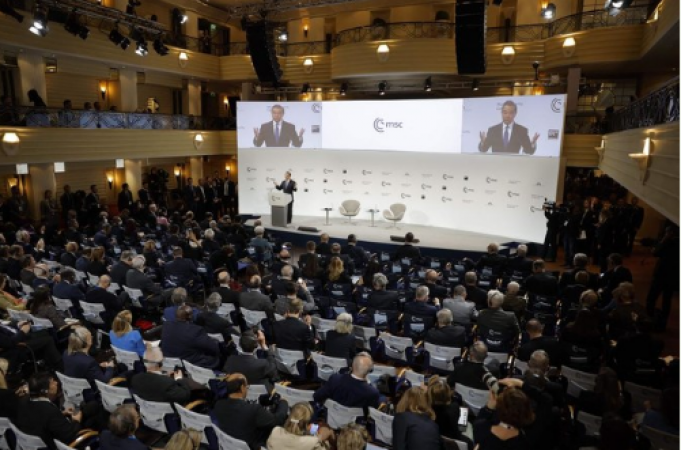
MUNICH: Top Chinese diplomat Wang Yi was warned on Saturday by US Secretary of State Antony Blinken that there would be dire consequences if Beijing provided material support for Russia's invasion of Ukraine.
Blinken said in an interview after their meeting that Washington was concerned that Beijing was considering providing arms to Moscow.
Top diplomats from the two superpowers held an undisclosed meeting on the sidelines of a global security conference in Munich, after criticizing Washington as "hysterical" in a long-running dispute over the US downing a suspected Chinese spy balloon. met at the location.
Also Read: Long-range missile fired by North Korea after warning US and South Korea about drills
Relations between the two countries have been strained since Washington claimed China sent a spy balloon over the US mainland before it was shot down by US warplanes on the orders of President Joe Biden. The conflict also occurred as the West closely monitors Beijing's response to the conflict in Ukraine.
Blinken said he had made it clear to Wang that doing so "would have serious consequences in our relationship" in an interview that will air Sunday morning on NBC News' "Meet the Press with Chuck Todd." According to Blinken, the United States is extremely concerned that China is considering providing lethal support to Russia.
They are considering offering various types of lethal assistance, including at least weapons, according to Blinken, who also said Washington would provide more details soon.
According to a brief statement issued by China's foreign ministry on Sunday, Wang told Blinken that the United States should "face up and resolve the damage" to bilateral relations "caused by its indiscriminate use of force."
Also Read: Chinese laser attack, according to Marcos, is insufficient to trigger the US defence pact
Wang was referring to the recent downing of an aircraft that Beijing claimed was a weather observation aircraft but the US claimed was a spy balloon.
A senior State Department official told reporters during a briefing call that China wanted to contribute to peace and stability by taking "relevant" steps to support Russia's invasion of Ukraine, saying the effort was "both ways". doing.
The senior official, who spoke on condition of anonymity, said that Blinken was "quite blunt in warning about the implications and consequences of China providing material assistance to Russia or helping Russia avoid systematic sanctions."
Just before Russian forces invaded Ukraine in February last year, Russia and China signed a "no borders" partnership, and since then, their economic ties have grown.
Some have warned that a Russian victory would affect China's actions toward Taiwan, so the West has been wary of China's response to the conflict in Ukraine. China has resisted condemning the conflict or labeling it an "aggression".
Wang had earlier called for dialogue during a panel discussion at the conference and advised European countries to "think calmly" about the end of the war.
Without naming any specific parties, he said that "certain forces" "do not want the talks to succeed or the war to end quickly."
China's top diplomat met with Blinken, hours after the United States was targeted, accusing the country of shooting down the balloon and violating international norms.
The balloon's flight over US soil this month caused a stir in Washington and forced Blinken to cancel a trip to Beijing. Both sides saw the visit, which was the first by a US secretary of state to China in five years, as an opportunity to normalize relations that had been growing increasingly tense.
According to Wang, sending a sophisticated fighter jet to use a missile to shoot down a balloon is an absurd and almost hysterical act.
There are a lot of balloons in different countries and all over the world. So, will the United States shoot them all down? They said.
When the US military shot down a 200-foot (60 m) balloon on 4 February, claiming it was for weather monitoring and flew prematurely, China reacted angrily.
Washington claimed that it was apparently a surveillance balloon with a sizable electronic-holding undercarriage. Blinken and Wang's decision to reconnect in person was questioned during the conference in Munich, and their hour-long meeting was confirmed by the State Department only after it had ended.
Blinken claimed that in the interview with NBC, Wang did not express regret for blowing up the balloon.
Regarding the balloon's infringement of US airspace, Blinken said, "I told him quite simply that that was unacceptable and can never happen again."
He added that he had not talked to Wang about rescheduling his trip to China, saying "There was no apology." With China's response to Nancy Pelosi's visit to Taiwan as speaker of the US House of Representatives in August, relations between the two countries reached a dangerous low. Washington had hoped to restore some normalcy to the situation.
Also Read: Indonesian students discover a Middle Eastern entryway in Arabic literature
Although Wang's remarks at the conference were probably intended to allay embarrassment over the balloon incident, Craig Singleton, a China expert at the Foundation for Defense of Democracies in Washington, said the lack of a robust response from Washington "increases China's appetite for risk in future disputes."
"The meeting between Blinken and Wang will not halt the deterioration of US-China relations. The lack of trust between the two sides is evident, Singleton said.